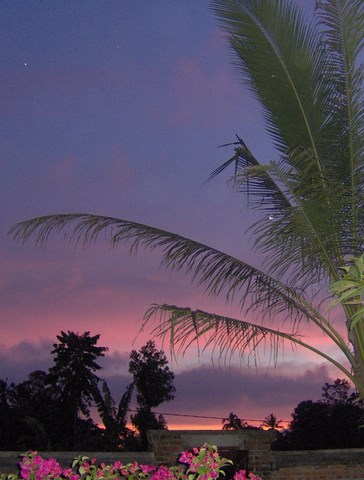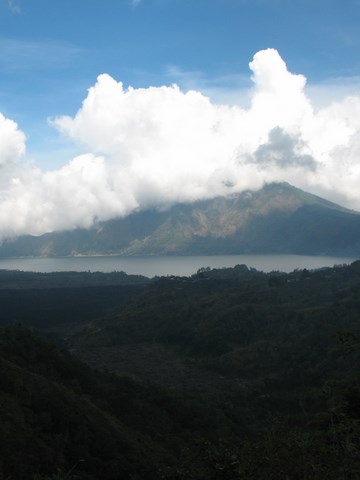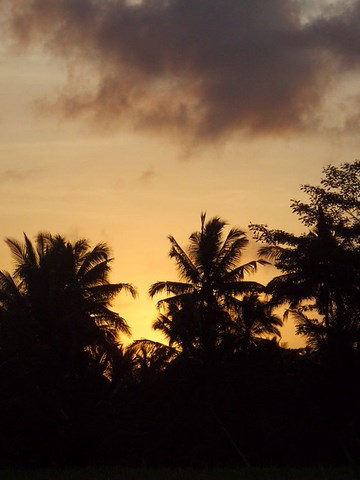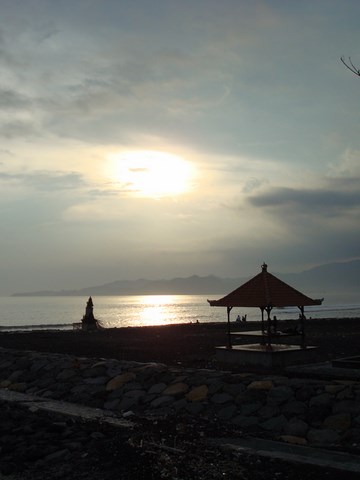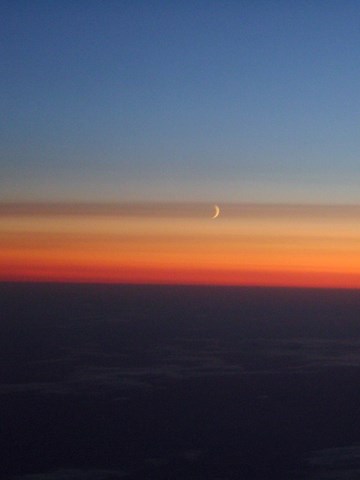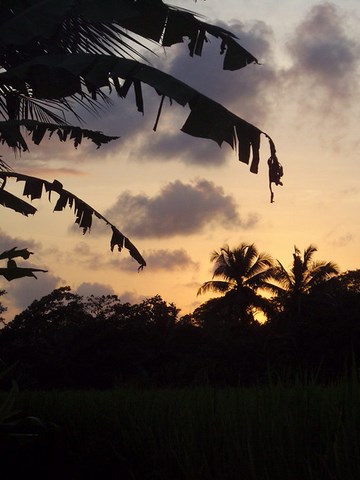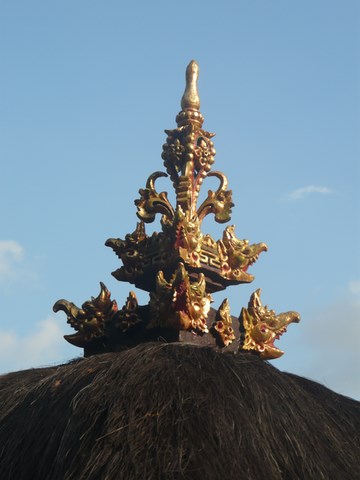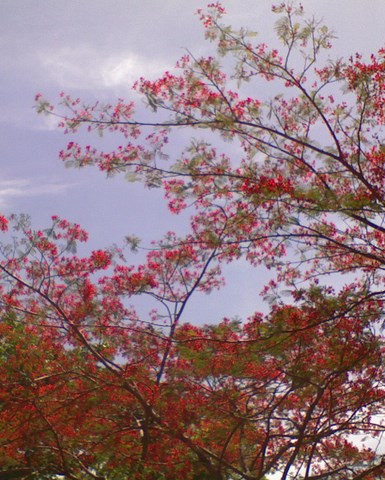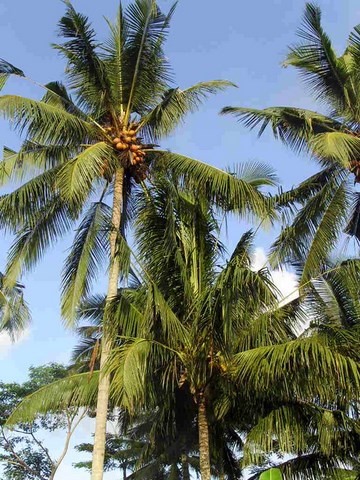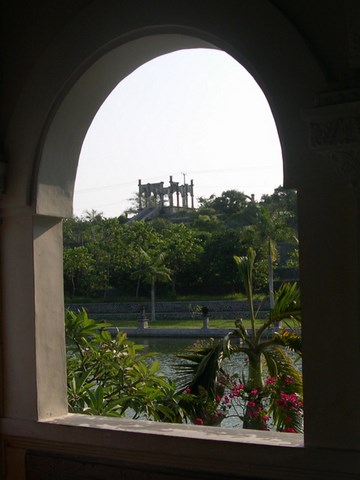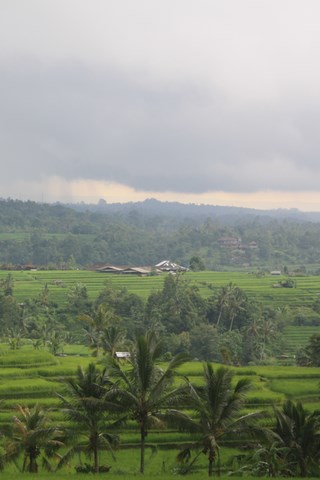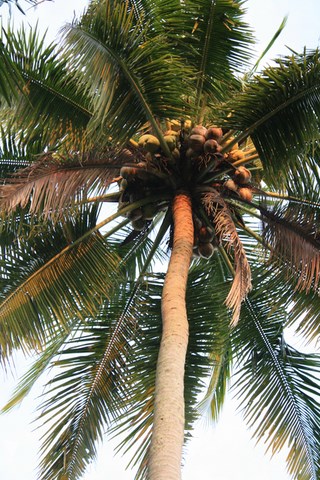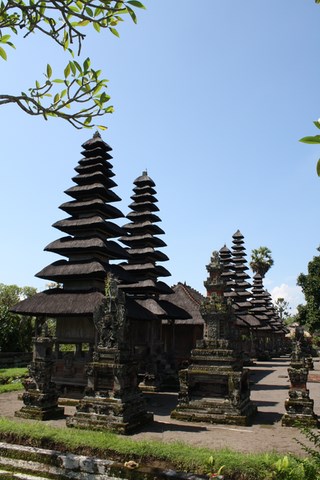Useful information
- Quand venir ?
- - climate
- - Toursit seasons
- - Flower season: October, november, december
- Staying for how long?
- Resident Or Nomad During your Stay?
- Why staying in Ubud?
- Where to go and what to do during your stay in Bali?
- Short Stay: 1 or 2 Weeks
- Long stay: 3 or 4 weeks
- How to prepare your lugage?
- Vaccination...
- mosquitoes? Did you say mosquitoes?
- anti-malaria Treatment?
- Visas
- Exit tax
- Driving licence
- Money: Cash Or Bank Card?
- Electricity
- Internet: Should You Take Your Laptop, Tablet or Smartphone?
- Cell phones and smartphones
- How to call from and to Indonesia?
- Warning about The Balinese New Year: "Nyepi"
- Practical information bis: The beginnings of the trip
Quand venir ?
- climate
In Bali it is always nice and sweet.
Near the equator*, Bali enjoys a hot and humid equatorial climate all year round. (8° South from the equator.)
The dry season would be maybe more from April to October, the rainy season would be maybe more from November to March. But here too the climate is really pertubated and changing like everywhere eslse in the world.
For more than 18 years, without this being systematic, the rainy season began from mid-December and ended in March... but we also had May to November dripping and resplendent March and April! July and August are supposed to be the driest and windiest (this is the great season for kites) but in recent years July has often been rainy.
A chance, even during the rainy periods, it often rains at night and the mornings are usually beautiful.
Average temperatures are between 28 and 32 ° C.
22 to 25° C for the coolest months: July and August;
28 to 32° C for the warmest months.
Whatever the date of your stay, you are as lucky to have a bright sun as a grey and rainy weather with, sometimes, equatorial showers worthy of a documentary on the precipitation but anyway temperatures are always soft.
We traditionally distinguish 3 main climate zones in Bali:
- the North (north of the volcano range) with a generally mild and sunny climate, sometimes drier;
- the Center (from the southern slopes of the mountains to approximatively Ubud) with a more humid and rainy climate and, consequently, the magnificent rice fields and tropical luxuriance;
- the South (from Denpasar) warmer and drier.
- Toursit seasons
Tourism attendance is significantly higher from April to September and the last 15 days of December and each period of Western school holidays: winter holidays, Easter... (The calmest months are often from January to April.)
However, do not worry, tourism here is not comparable to what we can know in Europe. There is no tourist rush in Bali and never as many people as for visiting the Eiffel Tower or the Statue of Liberty...
In Bali, tours are always very pleasant, sweet and smily, like Balinese people.
But if there was a period to avoid because of the large number of tourists, it would be without hesitation, the first half of August.
- Flower season: October, november, december
There are many flowers and blooming trees throughout the year. However the best flowering (especially for Flamboyants) is in October, November and December.
It is also a period during which there are clearly fewer tourists and, contrary to popular belief, often a very beautiful blue sky, which is relatively rare in Bali...
Staying for how long?
Because the travel is very long when you'll arrive in Bali you will suffer of jet lag* so a first short stay will be correct during 1 or 2 weeks, a first long stay, 3 to 4 weeks.
The ideal, especially for a first visit being, perhaps, 3 weeks.
(*) 6 hours of time difference in summer time (10h in France = 16h in Bali the same day) and 7 hours in winter time (10h in France = 17h in Bali the same day).
Resident Or Nomad During your Stay?
Is it better to radiate from a central point or move from one point to another?
Because of the geography of the island and its economical organization, no doubt, we recommend the first formula, namely that it is often more pleasant to choose one (or two) place of residence from which you will be able to radiate.
The choice of this place is easy because the most pleasant place to settle in Bali and radiate from there almost all around Bali (except the "far far west" of Bali) is Ubud.
(And that's good because it's exactly where we are :-)!)
However, because for a lot of people "holiday" is synonymous with seaside, if you want to combine the pleasures of water and those of touring, the north-east of Bali can be a good place for a few nights.
Why staying in Ubud?
The advantages of Ubud are above all:
- Its central position,
- Its many tourist facilities (hotels, restaurants, easy organization of visits and transfers, banks, shops ...),
- The large number of activities on site or nearby (and the list is not exhaustive):
- Sports activities: hiking and biking, rafting, climbing Mount Batur, trekking...
- Artistic activities: lessons and workshops of painting, dancing, offerings, carving, yoga...
- Cultural activities: museums, cultural shows every night, festivals...
- Relaxation: spas and massages in Ubud and in almost all hotels and villas. (At Pariliana too !)
- Nearby wildlife parks: Taro Elephant Park, Safari and Marine Park, Bird and Reptile Park, Gianyar Zoo...
Where to go and what to do during your stay in Bali?
Short Stay: 1 or 2 Weeks
- Start your trip in Ubud or, if your plane arrives late and if you want to get away from the jet lag by taking advantage of the sun and seaside, spend your first night near the airport (Jimbaran, Kuta, Legian, Seminyak ) or Sanur and go the next day to Ubud.
- Stay as long as possible in Ubud because it is from here that you can radiate, make all the essential visits and discover the soul of Bali.
- Finish your stay by 1 or 2 nights in the South, near the airport, to minimize the stress of leaving, enjoy the beach and make the few essential tours in south Bali (Tanah Lot, Ulu Watu and the Mangrove and for those who enjoy History, the Bajra Sandhi Museum of Renon in Denpasar...).
Long stay: 3 or 4 weeks
- Start your stay in Ubud or 2 nights in the South (Pecatu, Jimbaran, Kuta, Legian, Seminyak or Sanur).
- Stay in Ubud for 2 to 3 weeks and alternate days of excursions with days of sports and / or cultural activities and rest / well-being,
- Go to the northwest (Pemutaran for diving and the proximity of the regional park through the rice paddy road of Pupuan and Blimbing) or Munduk for hiking and proximity to the Lovina region, if you want to visit.
- From there, go to the north-east (Amed, Padang-Bai or Candi Dasa) for the beach and snorkeling and visits in the north-east: Seraya Road, Ujung Palace and Tirtagganga, villages of Tenganan, cave of Goa Lawah...
- Finish your stay in the South (Sanur, Pecatu or Jimbaran...) for visiting the South and for the pleasures of the seaside and being close to the airport.
How to prepare your lugage?
You will find everything you need on site and come to Bali can be the perfect opportunity to remake his summer wardrobe at low prices... but it is sometimes easier to put in your luggage:
- A flashlight (the night falls early and quickly, which is sometimes surprising.)
- A jacket (In the mountains temperatures are cooler and, at least for the inevitable visit of a volcano, so it is important not to forget to slip in your suitcase a long-sleeved T-shirt or a jacket.)
- A light rainproof jacket if you have one. They can be useful all year long and anyway do not weigh heavily in the suitcase. (But if you do not have one, do not worry, here you will find cheap umbrellas that will last the time of your trip and will be enough.)
- A small emergency pharmacy kit for not runnig when need. (Do not forget syrups or pills for cough and throat pains. That is often the first thickness you'll get in the plane or arriving in Bali.)
- No need for sheets, towels or towels during the time of your stay with us. This is part of the linen available to you.
- The ideal outfit is probably a short trousers or Bermuda shorts and a T-shirt or shirt. The shorts are possible but shock more, especially for the ladies because they are above the knee (however the children are all in shorts and the adults (men and women) are too, at home and in the rice fields but not in the cities ...). On the other hand T-shirts that leave the shoulders uncovered* and small light dresses (on or under the knee, preferably) are OK. Prefer light pants than jeans that are often too heavy, hot and sometimes too tight to feel good and comfort in Bali. (* Here too, over time and more and more abuses, this begins to change and to visit the temples, for men as for women, always prefer T-shirts that cover your shoulders to tank tops.)
- For shoes, choose the flip flop (that are very cheap here) or the open sandal (which is better to bring from your country) even for tours. If possible slip a pair of closed shoes, for example tennis shoes, it will be warmer but also more comfortable on some occasions and mostly if you walk a lot.
- If you are planning a few days in Amed or elsewhere for the pleasures of the beach and / or snorkeling, do not hesitate to bring dive slippers or plastic sandals that fit the foot and protect your feet from corals or others.
- One of the effects of the relatively high humidity in Bali is to quickly discharge the batteries from all devices that use some. If you have one, take a second battery for your camera and especially the chargers that will allow you to charge your cameras and phones, every day, so as not to run out of battery in front of the landscape of your dreams...
- Travel light and with a lot of empty space in your luggage when you come because it will surely be full and heavy when you'll go back home!
Vaccination...
There is no vaccine or other medical treatment needed to come to Bali, not even malaria. On the other hand, if you want to go to other parts of Indonesia it can be recommended and it is better to check with your doctor.
mosquitoes? Did you say mosquitoes?
Yes, there are mosquitoes in Bali but few compared to many other countries (and often little compared to Europe in summer).
You will find many mosquito repellents here in the supermarkets. If you take it from your country, prefer the usual brands sold in pharmacies, for children (often sufficient and less harmful), special tropical or not, which soothe and protect. On the other hand, no need for the one to put on clothes that smells so bad that no one wears it ...
The anti-venom pumps sold in pharmacies in Europe (attention: you will not find them here) are very effective against mosquito bites.
If you spray some anti mosquitoes (easily found here) in the evening at mosquito time around 17:00-20:00 or before going to bed is generally enough to protect yourself.
anti-malaria Treatment?
If you just plan to go to Bali anti-malarial treatment is not necessary.
But if you want to visit other Indonesian islands, it may be better to take it. Please, check with your doctor.
Visas
Since the pandemic, all tourists must pay a visa upon entry to Indonesia.
The "tourist visa", for all stays of less than 30 days, can be obtained upon arrival at the airport but also in advance on the official Indonesian immigration website: https://evisa.imigrasi.go.id (note that you must normally apply during office opening hours, i.e. with a time difference of 7 hours (at midnight in France it is 7 am in Indonesia) in winter and 6 hours in summer.)
You must also pay the "Bali Tax", either upon arrival at the airport or in advance on the website: https://lovebali.baliprov.go.id
Finally, no earlier than three days before your arrival in Bali, you will need to complete your customs declaration and health declaration by filling out the "All Indonesia" card at https://allindonesia.imigrasi.go.id
This multiple declaration can also be completed upon arrival by scanning a QR code (but it's simpler and less stressful to do it before your trip).
In addition, if your stay exceeds 30 days, you will have to pay for an entry visa to be requested before your stay or request the renewal of your tourist visa, for a period of 30 days, when you are there.
Exit tax
Since 2015 the exit tax does not exist anymore when one goes abroad by the airport of Denpasar or the one of Jakarta but maybe it still exists in the other smaller airports... Get information if you leave Indonesia by another airport.
Driving licence
If you want to rent a car, a motorbike, a moped, a scooter... do not forget to get, before coming, an international driving license, with, if possible, the mention "motorcycles allowed".
Money: Cash Or Bank Card?
The Indonesian currency is the rupee (IDR = Indonesian Rupiah). This is not an international currency. Normally, you will not be able to get some before your departure and anyway, it's useless and the exchange rate will be very bad for you.
You do not need to bring any American dollars either. You can pay everything in Indonesian rupees and you will change some money of your own country (if it is an international currency like euro) when you'll be here.
Upon arrival at the airport (after the queues and after collecting your luggage and customs) it may be necessary (to take a taxi for example) to change some money. Change the necessary only (40 or 50 € maximum) because the exchange rates are much more interesting in Ubud where you can change the same day or the day after your arrival.
It is very easy, in Ubud and in the south of Bali, to find money changers and ATMs but it is still more difficult in the rest of the island. Moreover, it is strongly advise not to change your money in money changers on the South aera (Kuta, Legian, Seminyak, Ulu Watu, Sanur...) where rogues are located and attract you with wonderful exchange rates.
However, in Ubud you can be trustful, here too, just go in the official money changers and not into the small shops. Avoid changing from Friday evening because weekend rates are always worse than those of the week.
Some ATMs in Bali allow you to withdraw up to 3 million Rupees (about 159 €*) at one time and at most you can withdraw up to 7, 10 or 12 millions per day following to the ATM bank.
Your bank will charge an amount (usually fixed + %) to each of your withdrawals, hence the interest of withdrawing the maximum at one time.
(*) Average rate of October 2025 of 1 € for 18 850 Rp.
The maximum amount you can withdraw in a week is set in your contract with your bank. (This is the same maximum amount in your country or abroad, it can easily be changed for the duration of your holiday if you ask your bank or change it yourself on your bank on line interface.)
It is therefore more advantageous to take cash with you, in order to avoid the unpleasant surprise of the bank fees with each withdrawal or payment by bank card that you'll discovers, on your statement of account, after your return !!!
NB: Attention, still very few shops or hotels accept credit card payments in Bali.
To avoid unpleasant surprises: tell your bank that you are going on holiday in Indonesia and insist that they inform, before your departure, the center of the visa cards so that your card is not blocked from its first use in Indonesia for suspicion of fraud.
Electricity
The electricity is 220 V (as in France) and the electrical outlets are also the same as in France. No need for adapter if you come from Europe. If you come from England, Singapore or from another place in the world where the outlets are differents you'll find adaptators in the supermarkets here.
Internet: Should You Take Your Laptop, Tablet or Smartphone?
In Pariliana, we offer you a free WiFi* Internet connection anytime and every where in your accomodations and in our restaurant.
In Ubud, connections are very cheap in the cyber shops and WiFi is often present and free in cafes and restaurants.
So it can be very useful and simple to take your computer, tablet or smartphone, to connect without worry every where in Bali.
(*) See Services section
Cell phones and smartphones
You can buy a cheap local SIM card that you can insert in your cellphone or smartphone during your stay.
Ask your provider about this possibility and check that your phone is unlocked to allow you to put a local SIM card and / or perform international calls and texts.
If you prefer to keep your number during your stay, all you need to do is to switch off mobile datas to avoid roaming charges. Your smartphone will only be updated when it is connected to WiFi but you can still be contacted on your number such as sending and receiving texts.
How to call from and to Indonesia?
Perhaps you have already noticed that the phone numbers in Indonesia are sometimes very different from what is known in Europe and it is often very difficult to understand what is the region code or zero to do or not to do...
To help you in your understanding, here are some simple examples to test with our phone numbers:
- If you are calling from a handphone with a foreign number (handphone with non-Indonesian sim card) or from abroad, dial +62 361 849 3630 * or +62 812 3603 8322
(The "+" is usually obtained by pressing and holding the "+" key and allows the network to automatically choose the correct international code. On a wired phone dial the international code provided by your operator ( eg "00").)
- If you are calling from a local phone (Indonesian or Indonesian sim card mobile phone):
- with an handphone dial 0812 3603 8322,
- with a wired phone:
- if you are calling from Ubud or the whole southern region of Bali (Gianyar, Denpasar, Sanur, Kuta...) dial directly 849 3630, (no need for the area code "0361")
- if you are calling from anywhere else in Indonesia (including all other parts of Bali) dial 0361 849 3630 (with area code)
There you go !
(* This phone number is just an example. It's our landline number but it's not plugged in... Do not try, no one will answer you!)
Warning about The Balinese New Year: "Nyepi"
In 2025 Nyepi will be Saturday, March 29. (We will enter the year Ҫaka 1947)
Then Nyepi will be the:
- Thursday, March 19, 2026 (Ҫaka 1948)
- Monday, March 8, 2027 (Ҫaka 1949)
- Sunday, March 26, 2028 (Ҫaka 1950)
- ...






